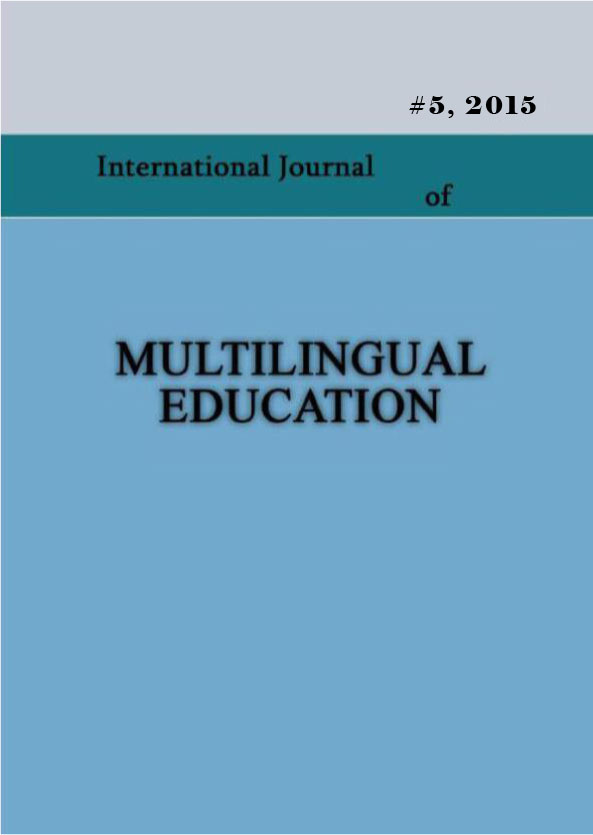Textbooks for Minority Schools of Georgia; Problems and Challenges
Keywords:
Multilingual education; textbooks;, Minority schoolsAbstract
This article explores research results on challenges and problems of schools textbooks for non- Georgian schools in Georgia. The desk research and focus group discussions research methods were utilized in the study. The research revealed interesting patterns on problems of schools textbooks for minority schools, specifically: a) the problem of quality of translation of the textbooks; (b) The school textbooks contain stereotyped material as well as diversity of Georgia and intercultural aspects are not reflected in school textbooks. Some paragraphs in schools textbooks contain discriminative elements toward different minorities. (c) The portion of the material in the state language in bilingual textbooks is difficult for pupils to understand because neither the pupils and teachers nor parents speak the state language well enough to incorporate the material in teaching and learning process. The research findings have important practical and educational implications. The author argues that, it is crucially important to make the policy changes for improvement of school textbooks for minority schools in order to achieve the goal of civil integration of ethnic minorities through educational system.
References
Gabunia, K. (2014a). Language Situation in Modern Georgia 1. Kartvelian Languages. International Journal of Multilingual Education, 2 (1), p 13-34.
Gabunia, K.(2014b). Language Situation in Modern Georgia 2. Caucasian and Non-Caucasian Languages. International Journal of Multilingual Education, 2 (2), p. 1-21.
Gorgadze, N. & Tabatadze, S. (2014). Analysis of the development of lifelong learning and regional action plan for promoting efficient educational management; Tbilisi; Caucasus University Fund.
Government of Georgia (2009). National Concept for Tolerance and Civil Integration and Action Plan for 2009-2014 retrieved on March, 22, 2015from the web-site: http://www.smr.gov.ge/docs/doc43.pdf .
Ministry of Education and Science of Georgia. (2009) The rule of school textbook approval. Tbilisi.
Ministry of Education and Science of Georgia. (2010) The rule of school textbook approval. Tbilisi.
Ministry of Education and Science of Georgia. (2011) The rule of school textbook approval. Tbilisi.
Ministry of Education and Science of Georgia. (2012) The rule of school textbook approval. Tbilisi.
National Curriculum and Assessment Centre. (2011). National Curriculum of Georgia 2011-2016. Retrieved http://www.mes.gov.ge/content.php?id=3929&lang=geo.
Office of the State Minister of Georgia for Reconciliation and Civil Equality (2014). Assessment document on the implementation of the national concept for tolerance and civic Integration and action plan for 2009-201, retrieved on March 22, 2015 from the web-site: http://www.smr.gov.ge/docs/doc329.pdf.
Parliament of Georgia (2005). Georgian Law on General Education retrieved on June 25. 2013 from the web-site: www.parliament.ge .
Parliament of Georgia (1995). Constitution of Georgia, retrieved on June 25. 2013 from the web-site: www.parliament.ge .
Public Defenders Office of Georgia (2012). Monitoring results of implementation of the National Concept and Action Plan on Tolerance and Civil Integration in 2010-2011. Retrieved on March 22, 2015 from the web-site: http://www.ecmicaucasus.org/upload/cnm/UNDP-Publication-ENG-FINAL.pdf .
Tabatadze, S. Gabunia, K. & Odzeli, M. (2008). Recommendations on language policy to protect linguistic minorities. Tbilisi: Centre for Civil Integration and Inter-Ethnic Relations.
Tabatadze, S. (2009). The reform of education system of Georgia and non-Georgian language schools. Tbilisi: Caucasus Institute for Peace, Democracy and Development.
Tabatadze, S. (2010a). Intercultural education in Georgia. In Culture dialogue and civil consciousness (pp. 63-86). Tbilisi: Caucasus Institute for Peace, Democracy and Development
Tabatadze, S. (2010b). New initiatives of education policy in the context of civil integration. Tbilisi: Caucasus Institute for Peace, Democracy and Development.
Tabatadze, S. (2011). Bilingual educational policy in Georgia. In Human diversity in education, integrative approach (pp. 282-284). New York: McGraw-Hill.
Tabatadze, S., Gorgadze, N., Gabunia, K., Khomeriki, I., & Tinikashvili, D. (2013). Intercultural Education Research in Primary Grades of Georgia. Tbilisi: Centre for Civil Integration and Inter-Ethnic Relations.
Tabatadze, S., & Gorgadze, N. (2014). Intercultural sensitivity of primary school teachers of Georgia. International Journal of Education and Research, 6, 281-300
Tabatadze, S. (2014). Positive Effects of Bilingualism on Cognition and Language Acquisition. International Journal of Multilingual Education, 2 (1).1-12.
Tabatadze, S. (2015). Factors Influencing the Effectiveness of Bilingual Educational Programs: The Prospects of Pilot Programs in Georgia. Sino-US English Teaching, 12 (2), 93-109.
United Nations Association of Georgia. (2010). Monitoring Results of İmplementation of the National Concept and Action Plan on Tolerance and Civic İntegration 2007-2009 Tbilisi; UNAG.
Published
How to Cite
Issue
Section
License
Copyright (c) 2015 Shalva Tabatadze

This work is licensed under a Creative Commons Attribution-NonCommercial 4.0 International License.
Copyright (c) - Authors who publish with this journal agree to the following terms: Authors retain copyright and grant the journal the right of first publication with the work simultaneously licensed under a Creative Commons Attribution-Noncommercial 4.0 International License, which allows others to share the work with an acknowledgement of the work's authorship and initial publication in this journal. Authors are permitted and encouraged to post their work online (e.g., in institutional repositories or on their personal website) prior to and during the submission process, as it can lead to productive exchanges, as well as earlier and greater citation of published work (see The Effect of Open Access). Authors may enter into separate, additional contractual arrangements for the non-exclusive distribution of the journal's published version of the work (e.g., post it to a repository or publish it in a book), with an acknowledgement of its initial publication in this journal.

